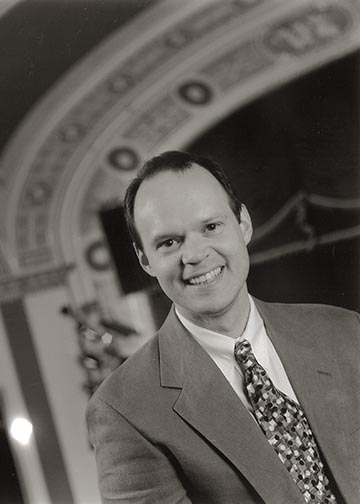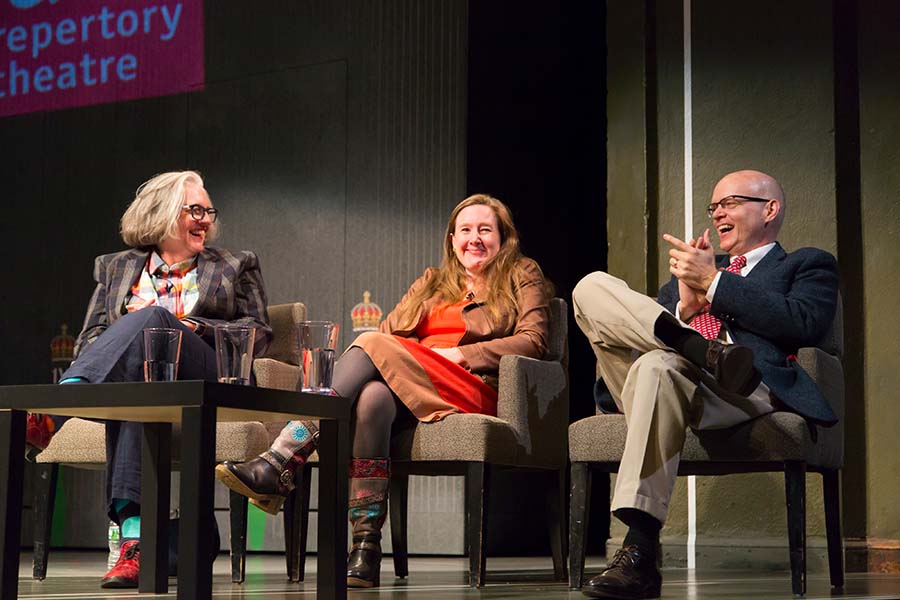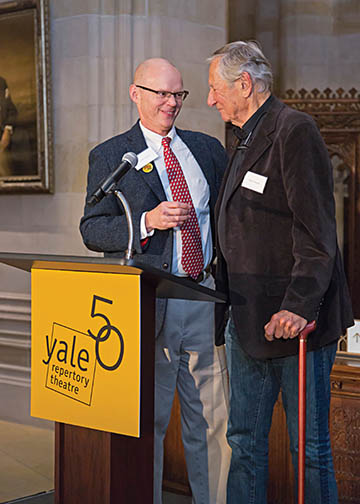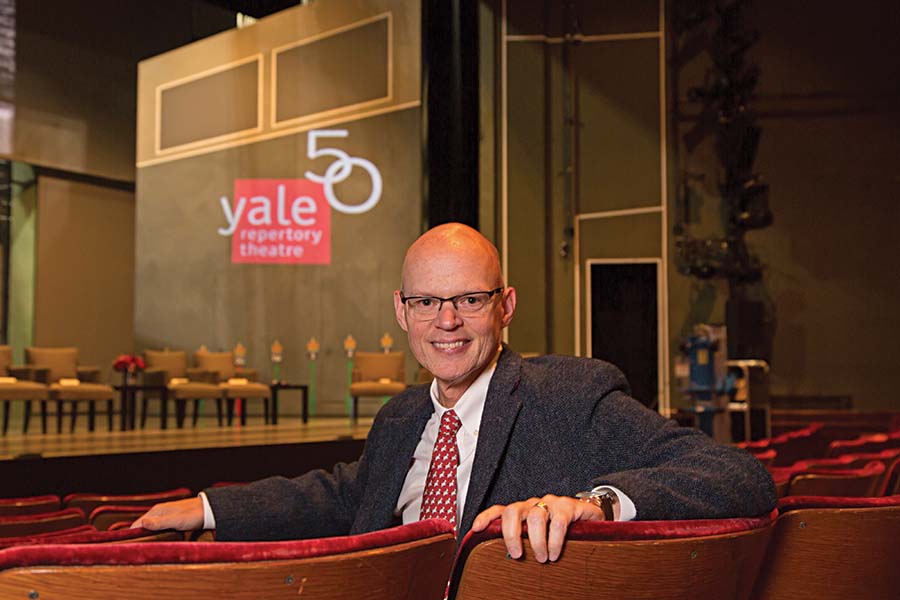The search for a new artistic director for Yale Repertory Theatre and dean for Yale School of Drama—a unique hyphenate in American theatre—was not a smooth one in 2001 for Richard C. Levin, then president of the Ivy League university in New Haven, Conn.
After a protracted process—several high-profile names passed on the job—James Bundy, artistic director of Great Lakes Theater of Cleveland, then 42, was chosen, becoming the fifth dean since Yale became a professional school, and only the fourth artistic director in Yale Rep’s 51-year history, following founder Robert Brustein, Lloyd Richards, and Stan Wojewodski Jr.
What made the appointment even more surprising was that just six years earlier, Bundy had been a student at the school.
But if it started as an unexpected choice, the Bundy era at Yale Rep has grown over the decades into an unprecedented theatrical legacy. At last year’s golden anniversary celebration for the Rep, current Yale president Peter Saloway announced Bundy’s fourth five-year appointment. He is reportedly the longest-serving artistic director/dean in the U.S., and by the end of his fourth term in 2022 he will have overseen nearly seven generations of graduate classes.
“He has been a force of advocacy for building a more equitable and inclusive theatre field,” says Teresa Eyring, executive director of Theatre Communications Group and an ’89 YSD grad. “People also look to him for that combination of wisdom and clarity of thought that he brings to complex decision-making.”
Though few may have predicted Bundy’s long run at the start of his tenure, those who know him well were not surprised at his appointment.
“When I first met James in our freshman year at Harvard, he just blew me away,” enthuses Bill Rauch, artistic director of the Oregon Shakespeare Festival and former A.D. of Cornerstone Theater Company. “For James, it’s always about the work, not his ego—which is part of what makes him such an extraordinary leader.”

Born the youngest of four sons into a family of privilege—his father was McGeorge Bundy, a national security advisor to JFK and LBJ—James took an artistic path from an early age. Though the Boston-born, D.C.- and New York City-raised Bundy’s nominal major at Harvard was English (following preliminary study at Groton), he quickly veered to the undergrad theatre scene in Boston.
Wanting to be a director but unsure of the best path, he turned to acting when he graduated in ’81, later studying at London Academy of Music and Dramatic Arts. For the rest of the ’80s, Bundy took on roles in various West Coast productions.
When the itinerant Cornerstone company, under artistic directors (and college friends) Rauch and Alison Carey, needed a managing director, Bundy stepped into that executive position. But he made little headway toward his directing ambitions until a bout of soul-searching led him to apply to the Yale School of Drama in the early ’90s to pursue that artistic goal.
Upon graduating in 1995, he became an associate producing director for a year at the Acting Company before accepting the role of artistic director of Cleveland’s then-troubled Great Lakes Theater Festival. Once there, his job morphed into managing director as well, and he began that theatre’s turnaround before Yale called.
Bundy’s tenure at Yale has been marked, in part, by many large-scale and adventuresome productions, including musical projects; a dramatic reduction of student debt; creation of a projection design department; major roles for such artists and teachers as Paula Vogel, Sarah Ruhl, Ron Van Lieu, and Tarell Alvin McCraney; and the return of August Wilson to the Rep for what would be the playwright’s final work. Bundy also scored the largest gifts in YSD history to finance the Binger Center for New Theater, which commissions and develops new work. Adding personal drama to his Yale run were two health crises which threatened Bundy’s life.
We spoke over lunch on a summer afternoon in New Haven, weeks after the semester ended and as he began to prepare for the new season that will begin with Bundy directing Henrik Ibsen’s An Enemy of the People.
FRANK RIZZO: After 15 years at Yale, has the process of choosing a season changed for you?
JAMES BUNDY: I never really thought that my job was to say, “This is interesting because I think it’s interesting,” but rather to show what’s out there in the field that is urgent and meaningful that I can bring forward.
I spend the greatest amount of time with associate artistic director Jennifer Kiger, literary manager Amy Boratko, and resident dramaturg Catherine Sheehy, and a lot of what we’re discussing is new plays that are in the pipeline from the Binger Center for New Theater. We also have two resident directors, Liz Diamond and Evan Yionoulis, and two other members of the faculty who have directed regularly at the Rep, Robert Woodruff and Christopher Bayes. And I’m also speaking to a broader range of directors in the field who have projects they’re passionate about. Those are the essential conversations. That said, we have five slots!
Is there usually a keystone play that you build the season around, or a project that has been waiting to be done?
It varies. Sometimes there will be a big thing that you manage to get in there a year-and-a-half early, and it stays. Sometimes what we’re hoping to do disappears literally the day we are supposed to send the titles to the marketing department. That happened this year.
I tend to keep my powder dry until I see how the rest of the season is shaping up, and how things fit together. This season I was not originally slated to direct, and I was a little wistful because I thought, “Gee, now would be a great time to do Enemy of the People!” When we had to reshuffle, that play ended up being in the season. I don’t feel like I have to direct every year. In the years I don’t direct, there is one less middle-aged white guy directing at Yale Rep, and that’s probably a good thing.

One of the hallmarks of your tenure has been the inclusion of diverse playwrights and directors.
It’s important for the field that more theatres to do a better job at being equitable and inclusive. It’s 2017, and the time to start paying attention has long past. Most everyone I know is trying really hard, and the people who haven’t been trying so hard maybe have been properly critiqued by their peers. I went to a workshop at the TCG conference in Dallas three years ago led by Carmen Morgan, who wanted us to examine the difference between valuing diversity and practicing inclusion—and that was very eye-opening for me.
What did she mean?
You can value diversity without ever actually bringing diversity into your organization. You can also bring diverse people into your organization and marginalize them. [It’s about] sharing leadership and putting everyone in your organization in a position to contribute meaningfully and be rewarded meaningfully. That was a different lens for me to use. It led to changes in our faculty, staff, orientation, training, and in the curriculum. In 2015 Carmen and her company artEquity started coming to Yale to train, and now she’s a faculty member.
One of the things that Carmen has told me would happen—and it has happened, which has been great for the institution—is that when you start talking about these issues, then everybody joins the conversation, and then you hear things you didn’t expect to hear, and you have to respond to calls for change that are energetic.
Some might say it’s easier for a university to institute such change.
Underwriting plays of scale requires more resources than perhaps smaller theatres have, [and it’s difficult] to underwrite work that is aesthetically compelling but which is not necessarily a big box-office draw. But it doesn’t require more resources to do plays by women, or to have women directors. Those are resource-neutral questions, right?
And speaking of risk-taking productions…
Anybody who has had my job here has felt a sense of obligation, given our tremendous long-term security. We care as much about tomorrow’s [box-office] results as the next person, but in the long term we can and should take risks that other theatres are not positioned to take. If we’re not taking those risks, we’re doing a disservice to the field.
Whenever artistic directors are hired they talk about raising salaries, but it doesn’t always happen. How did you do it?
If we allow only market forces to dictate what actors are paid, they’ll hardly be paid anything, because there will always be more people who will want [the job] so that will artificially depress wages. Because we’re all nonprofit organizations, what we spend our money on is an indication of our values. We’re a professional training school, so if we don’t pay artists a professional, respectful wage, then we’re telling everybody in the community that it doesn’t matter if you train for three years, you’re never going to be able to put food on your table and you can’t imagine your children being able to go to college—unless you work in television or film. I want people to work in the theatre, and I want the theatre to be a real home for artists, as opposed to a place that requires them to subsidize the enterprise.
This is also reflected in the commitment to financial support for students here.
It’s a similar principle, except there it was a clear and more urgent necessity when I arrived. Students and faculty were unanimous that this was the No. 1 issue here—the average student indebtedness when I arrived was over $40,000, and that’s average, which means you have people with $80,000 in debt. And that was 15 years ago, when $80,000 was even more valuable than it is now. If we had continued further down that road of letting the indebtedness creep up over time, we would have gotten to a place where we were crippling people financially in ways that would not allow them to pursue a career in the arts.
And now?
The average indebtedness of a graduating student in 2015 was $16,000, which is something like a 60-percent reduction. I’d like to go a lot further. We have many students attend tuition-free, but not all. It would be great to get to a place where nobody was paying anything. These things go hand in hand. Artists’ compensation, financial aid students, faculty salaries—they’re all about taking care of people.
I imagine it’s been a disappointment not getting an upgrade to the facilities during your tenure, including a state-of-the-art theatre.
[Yale] President [Peter] Salovey has it at the top of his list of priorities, and I would be extremely surprised if we don’t manage to break ground during my fourth term. We will be able to move very quickly if and when a lead gift is confirmed. We’ve had, over the years, several passes with architectural consultants, so we have some strong conceptual ideas about the components: 25 percent new theatre, 25 percent production shops, 25 percent classroom space, and 25 percent administrative space. Currently the square footage is about half that of our peer theatres around the nation.
How do you envision a new theatre and school complex?
If you think about the truly great theatres in the world, they begin to establish relationships with audiences from the minute they see the building, with a sense of invitation, event, openness, and community. This happens, most especially, with people who are not traditionally theatre audiences. The first great dramatic show places were all outdoors, so they had transparency.
But you’re insisting on a roof, aren’t you?
Having lived a number of years without air conditioning, I’m very interested in HVAC.
In the past six years you’ve had two life-threatening health issues from which you proved remarkably resilient.
I had a micro heart valve repair in 2011, and then cancer in 2014.
How are you now?
I have no evidence of disease. My doctors regard me as a healthy person with an extraordinary history.
How have you changed because of it—or have you?
I kind of hoped that somehow that near-death experience would result in a much better personality—that I would be, I don’t know, more something. But I’m not more zen, more empathetic, more saint-like, or stronger so that nothing would ever faze me again.
Those experiences have made me a more grateful person. It’s made me more likely to not let things fester or let difficult situations last. I feel like I’ve had 11 years of gravy, quite frankly. I know half a century ago I would have been dead, and so it makes me a big fan of modern medicine and grateful every day.
Following your first health crisis came the deaths of managing director Ben Mordecai, August Wilson, alum Wendy Wasserstein, and Lloyd Richards. Did you feel there was a dark cloud over that relatively short time?
I didn’t experience it as what Queen Elizabeth called an annus horribilis. I felt tremendous sadness, yes, but I also felt a kind of obligation to continue the legacy of those people and to throw myself into what they had inspired in me. I still quote Ben Mordecai, who used to tell students, “Never negotiate with yourself.” I quote him at least a dozen times a year when a student has something difficult going on and they’re imagining walking back from what they really want.
What was it like growing up Bundy?
There was a lot of fun and laughter in our house, and it was a highly verbal, pretty competitive environment. Because there were four of us, we used to pretend we were the Beatles, and because I was the youngest I was always Ringo, the least cool Beatle.
What was the family’s reaction to your interest in the arts, especially when you became an actor?
My father was incredibly supportive across the board. Both of my parents were parented by people who—in the sort of contemporary pop-psychology parlance—would be described as “controlling,” so they made it a point to encourage us to do whatever we wanted to do.
I actually knew when I got out of college that I wanted to be a director, but I had no idea how to do that. So I went to acting school as a default position, because I figured that if I know about acting, that will eventually help me find my way into directing.

What made you decide, after becoming an executive at Cornerstone, to return to school to train as a director?
Our family went through a major intervention with my father. When you’re the adult child of an alcoholic and your parent stops drinking, then your own issues come home to roost and you have to take responsibility for them yourself. And so I went into therapy, and I realized I always wanted to be a director, and I hadn’t made any progress toward that aim, which for me was always a kind of permission thing. So that’s what prompted me to come here to Yale.
How did you prepare for the unique role of dean and A.D.?
I learned a lot from reading Bob Brustein’s memoir Making Scenes.
What was the best takeaway?
The best takeaway was the feeling of great good fortune that I didn’t have to found the theatre.
Was it difficult to oversee a faculty who were among your teachers just a few years before?
In my interview for the job with Rick Levin, he essentially asked me how I would feel being the person to whom my former teachers reported. I said I would approach it with a degree of humility and respect for their expertise, with an eye toward marshaling their best efforts toward the greatest good for the institution.
I had a very influential football coach when I was in high school who said, “It’s not the size of dog in the fight, it’s the size of the fight in the dog.” I think there’s a certain amount of sticking-to-it and trying to make things better from week-to-week and month-to-month and year-to-year that encourages not just institutional change but personal change.
Part of the Rep’s legacy is connected to August Wilson, whose final work of his 10-part cycle, Radio Golf, was produced here shortly before he learned he had cancer. He died later that year. If he didn’t have the Rep deadline, many speculate that he might not have completed the cycle.
You could game out another possibility, which is that August would have found out that he was ill and he would have written it anyway. The world works in mysterious ways. I’m going to assume that no matter what, that play would have gotten written.
The thing that certainly would not have happened is that he and Yale would not have had that moment of coming home, of completion, of recognition of the breadth of his achievement and his legacy here. The icing on the cake was that August’s assistant for that season was Tarell Alvin McCraney, so that sense of legacy, of a multi-generational project and our connection of artists through history, is really palpable.
How do you view the proliferation of college theatre programs in America?
The value proposition of what is being offered and its costs to the participants has to be closely interrogated by any institution. Most prospective students are under the age of 25, and therefore their frontal cortex is not fully formed. I think the lion’s share of responsibility for interrogating the value proposition falls upon the institutions—and to the extent that we as training institutions are advertising or scaling ourselves so as to emphasize professional training for a lifetime of employment in the theatre, we have an obligation for that training to be both excellent and inexpensive.
If we’re offering the training as a value proposition for its humanistic value, then we should be clear that’s what we’re doing. Those propositions can often be muddy, as they are related particularly to very eager, idealistic people who may not understand the professional, the artistic, or the financial consequences when they make their decision to train.
You must take special pride when a play by Paula Vogel—Indecent, which was developed and premiered at the Rep—becomes her first Broadway production.
I don’t think an institution like ours should set out every year to transfer work to New York. But if a play like Will Eno’s The Realistic Joneses or Indecent goes into the commercial sphere and starts to get productions nationwide because of its visibility and critical reception [in New York], those things matter to the future of the art form, and they matter greatly to the artists.
Yale president Salovey has called you the hardest-working dean in the university. Are you a driven guy?
He certainly said it, but for all I know he says it about every dean. I think of myself as highly motivated. I love what I do and I’m still learning. And I’m not done.
So I can’t really call you the James Brown of Yale.
That would be horrible if you did.
Frank Rizzo was the longtime theatre critic of the Hartford Courant.


